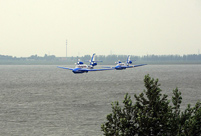 Happy life in Xinjiang
Happy life in Xinjiang
 2014 China Hainan Int'l Automotive Exhibition kicks off
2014 China Hainan Int'l Automotive Exhibition kicks off
 Collection of 'China Dream' public-spirited ads
Collection of 'China Dream' public-spirited ads
 The silent holy stones
The silent holy stones
 University students take care of giant pandas
University students take care of giant pandas
 Leading lady a true legend
Leading lady a true legend
 China Pan-Asia Stone Expo held in Kunming
China Pan-Asia Stone Expo held in Kunming
 Taiwan woman marries into Kazak family, 100 sheep plus a flat as dowry
Taiwan woman marries into Kazak family, 100 sheep plus a flat as dowry
 College girls take graduation photos under water in Chongqing
College girls take graduation photos under water in Chongqing
 Cartoon: Xi and football
Cartoon: Xi and football
BEIJING, July 11 -- When Shinzo Abe gutted Japan's pacifist constitution early this month to allow Japanese forces to fight abroad, Uncle Sam clapped and cheered, without exhibiting any scruples.
On the first look, the United States has good reason to do so. The constitutional reinterpretation Abe's cabinet adopted paves the way for Japan to play a bigger military role in Washington's regional maneuvers and thus in safeguarding the U.S. preponderance in Asia.
Tempting as it is, such a line of thinking is myopic and -- historically speaking -- wishful. As depicted in an old Chinese saying, the world's sole superpower is drinking poison to quench its thirst for global and regional leadership.
For starters, the Abe administration has proved to be a remorseless troublemaker in the region. From the farcical purchase of China's Diaoyu Islands to his outrageous visit to the Yasukuni Shrine, the prime minister has repeatedly infuriated neighboring countries.
And with its increasing bellicosity in territorial disputes and unmistakable connivance at the revival of Japanese militarism, the Abe administration has already added more malign variables to regional security calculations.
Against such a backdrop, the scuttling of Japan's ban on exercising the right to collective self-defense is alarming, not only to its neighbors, which suffered tremendously from Japanese aggressions in the past, but also to the United States, whose interest is best served by a stable Asia rather than by a provocative and opportunistic Tokyo ready to drag it into senseless wars.
The wariness about Abe's constitutional tampering in both domestic and international opinion is justifiable. For the Japanese, Abe is befouling their nation's pacifist soul and leading their country down a dangerous path. For neighboring nations, the trend is reminiscent of the lead-up to the dark days merely seven decades ago.
The historical nightmares of Asian nations might be remote for the United States, but the Pearl Harbor incident should have taught it a good lesson: Extremist right-wing elements in Japan should never be allowed to flare up again from the ashes.
As U.S. Defense Secretary Chuck Hagel meets his Japanese counterpart, Itsunori Onodera, in Washington on Friday, it is high time that the United States reconsidered its endorsement for Abe's Faustian flirtation with the specter of war.
In strategic planning, trade-offs between short-term and long-term interests may be inevitable now and then. But on matters of cardinal significance, it is always advisable to think back and think far.
 How Chinese men kill the time when their wives practice square dancing?
How Chinese men kill the time when their wives practice square dancing? Chinese Navy frogmen in training: photos
Chinese Navy frogmen in training: photos Lishui, city of longevity with 186 healthy men above 100 years old
Lishui, city of longevity with 186 healthy men above 100 years old Hong Kong Fashion Festival kicks off
Hong Kong Fashion Festival kicks off Germany crush Brazil to advance to World Cup final
Germany crush Brazil to advance to World Cup final Danish badminton team plays Chinese social media users on Asia tour
Danish badminton team plays Chinese social media users on Asia tour Art on eggshells
Art on eggshells Test flight of Russian amphibian BE-103 in Shenyang, NE China
Test flight of Russian amphibian BE-103 in Shenyang, NE China Stewardesses of CHR trains experience walk with white cane
Stewardesses of CHR trains experience walk with white cane Picturesque Bashang Prairie through lens
Picturesque Bashang Prairie through lens 'Finding Nemo' in Seattle Aquarium
'Finding Nemo' in Seattle Aquarium 28 old villages in Hunan under preservation
28 old villages in Hunan under preservation Anti-terrorism drills held in Luliang, Shanxi province
Anti-terrorism drills held in Luliang, Shanxi province Hot weather drives citizens to play mahjong in water
Hot weather drives citizens to play mahjong in water Largest domestic UAV exhibition held in Beijing
Largest domestic UAV exhibition held in BeijingDay|Week|Month